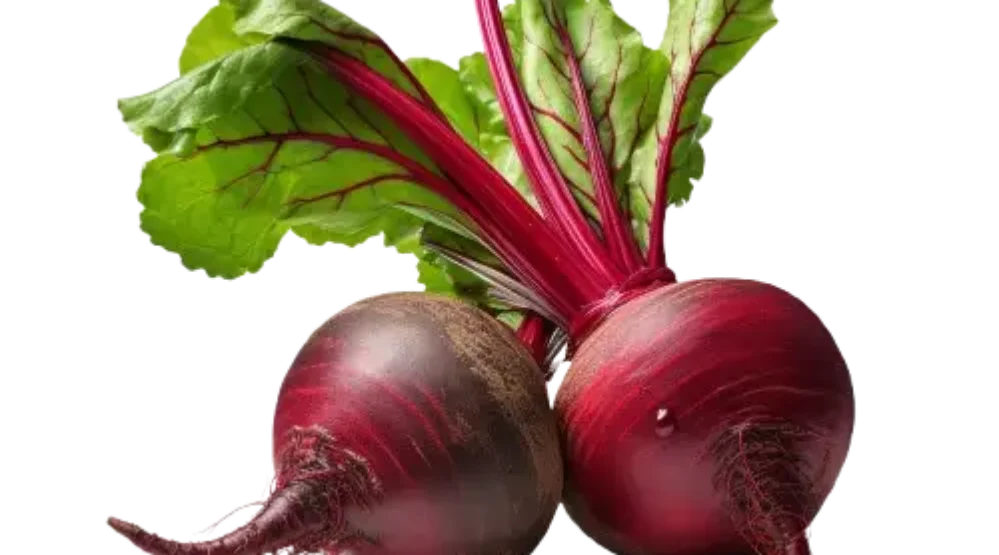Beetroot (Beta vulgaris), commonly known as beets, is a nutrient-dense root vegetable widely cultivated across Europe, North America, and Asia. Known for its deep red color, earthy taste, and medicinal properties, beetroot has been used in traditional medicine and culinary practices for centuries.
Beetroot (Beta vulgaris): A Comprehensive Guide
Packed with fiber, folate, iron, and powerful antioxidants, beetroot is recognized for its heart health benefits, blood pressure regulation, and athletic performance enhancement. This guide explores its history, nutritional profile, health benefits, medicinal uses, cultivation, and recipes.
Historical Significance & Cultural Importance
Beetroot has played a significant role in traditional medicine, agriculture, and culinary traditions across various civilizations.
Beetroot in Ancient Traditions
- Egyptian Medicine: Used for blood purification and digestion.
- Greek & Roman Influence: Consumed for strength and endurance.
- European Renaissance: Used as a natural dye and medicinal remedy.
- Traditional Medicine: Used in Ayurveda and Unani medicine for treating anemia, inflammation, and liver disorders.
Botanical Description
Beetroot belongs to the Amaranthaceae family and is classified under the Beta genus.
Plant Characteristics
- Growth: Herbaceous plant, reaching 30–60 cm in height.
- Leaves: Broad, dark green, with red veins.
- Flowers: Small, greenish, in clusters before fruiting.
- Root: Round or cylindrical, deep red, yellow, or white, with juicy flesh and earthy flavor.
Cultivation & Growing Conditions
Beetroot thrives in cool, temperate climates and requires well-drained soil.
- Ideal Temperature: 15–25°C for optimal growth.
- Soil Type: Loamy, slightly acidic soil with good drainage.
- Propagation: Grown from seeds.
- Harvesting Season: Spring and autumn, depending on the variety.
Nutritional Profile of Beetroot
Beetroot is rich in essential nutrients, making it a superfood for overall health.
Nutrients in Beetroot (Per 100g Serving)
| Nutrient | Amount | Health Benefits |
|---|---|---|
| Vitamin C | 4.9mg | Boosts immunity & skin health |
| Iron | 0.8mg | Supports blood circulation & prevents anemia |
| Fiber | 2.8g | Supports digestion & gut health |
| Potassium | 325mg | Regulates blood pressure |
| Nitrates | High | Enhances athletic performance & blood flow |
| Folate (Vitamin B9) | 109µg | Essential for cell growth & brain function |
Health Benefits of Beetroot
1. Supports Heart Health & Blood Pressure Control
- Reduces LDL (bad cholesterol) and boosts HDL (good cholesterol).
- Improves blood circulation, preventing heart disease.
- Lowers blood pressure, reducing hypertension risk.
2. Boosts Immunity & Fights Infections
- Rich in Vitamin C, strengthening immune defenses.
- Antioxidants neutralize free radicals, preventing cell damage.
- Protects against seasonal illnesses, including cold and flu.
3. Enhances Athletic Performance & Stamina
- Nitrates improve oxygen delivery, increasing endurance.
- Boosts muscle recovery, reducing fatigue.
- Enhances blood flow, improving exercise efficiency.
4. Supports Digestion & Gut Health
- High fiber content aids digestion and prevents constipation.
- Balances gut bacteria, reducing bloating and acidity.
- Stimulates gastric juices, improving nutrient absorption.
5. Aids in Weight Loss & Metabolism
- Boosts metabolism, helping burn fat faster.
- Suppresses appetite, reducing cravings.
- Detoxifies the body, eliminating toxins that slow weight loss.
6. Helps Manage Diabetes Naturally
- Regulates blood sugar levels, preventing spikes.
- Improves insulin sensitivity, reducing diabetes risk.
- Contains polyphenols, which protect pancreatic cells.
7. Supports Brain Health & Cognitive Function
- Enhances memory and focus, reducing brain fog.
- Protects against neurodegenerative diseases like Alzheimer’s.
- Reduces stress and anxiety, promoting mental clarity.
Medicinal Uses of Beetroot
1. Beetroot Juice for Immunity & Detox
- Recipe: Blend 2 fresh beetroots, strain, and add honey for taste. Drink daily for immune support.
2. Beetroot Powder for Digestion & Gut Health
- Usage: Dry and grind beetroot, mix ½ tsp powder with warm water. Drink before meals for gut health.
3. Beetroot Leaf Extract for Blood Sugar Control
- Usage: Boil beetroot leaves, strain, and drink as tea to regulate blood sugar and improve digestion.
4. Beetroot Vinegar for Heart Health
- Recipe: Ferment beetroot juice with apple cider vinegar for a cholesterol-lowering tonic.
Scientific Research on Beetroot
Several studies confirm beetroot’s therapeutic properties:
- Beetroot improves digestion and gut health.
- Beetroot extract enhances blood sugar regulation.
- Beetroot’s antioxidants protect against skin aging.
How to Include Beetroot in Your Diet
- Raw Beetroot – Eat fresh for maximum benefits.
- Beetroot Juice – Drink daily for detoxification.
- Beetroot Zest – Sprinkle on salads or yogurt.
- Beetroot Leaf Tea – Brew dried leaves for a healthy drink.
- Beetroot Smoothies – Blend with banana and coconut water.
Side Effects & Precautions
While beetroot is generally safe, excessive consumption may cause:
- Acidity due to high fiber content.
- Allergic reactions in sensitive individuals.
- Blood sugar fluctuations in diabetics.
Conclusion
Beetroot (Beta vulgaris) is truly a superfood, offering unmatched health benefits for digestion, immunity, athletic performance, heart function, brain health, and weight management. Whether consumed raw, as juice, powder, or tea, it remains a powerful natural remedy for overall wellness.
Start incorporating beetroot into your daily routine and experience its incredible benefits.




